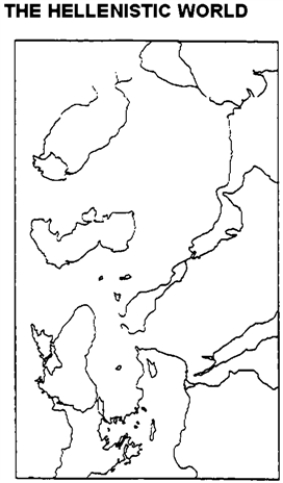Exam 3: The Greeks: From Myth to Reason
Exam 1: The Ancient Near East: the First Civilizations82 Questions
Exam 2: The Hebrews: a New View of God and the Individual74 Questions
Exam 3: The Greeks: From Myth to Reason95 Questions
Exam 4: Rome: From City-State to World Empire93 Questions
Exam 5: Early Christianity: a World Religion79 Questions
Exam 6: The Rise of Europe: Fusion of Classical, Christian, and Germanic Traditions89 Questions
Exam 7: The Flowering and Dissolution of Medieval Civilization84 Questions
Exam 8: Transition to the Modern Age: Renaissance and Reformation92 Questions
Exam 9: Political and Economic Transformation: National States, Overseas Expansion, Commercial Revolution84 Questions
Exam 10: Intellectual Transformation: the Scientific Revolution and the Age of Enlightenment86 Questions
Exam 11: The Era of the French Revolution: Affirmation of Liberty and Equality92 Questions
Exam 12: The Industrial Revolution: the Transformation of Society79 Questions
Exam 13: Thought and Culture in the Early Nineteenth Century82 Questions
Exam 14: Surge of Liberalism and Nationalism: Revolution, Counterrevolution, and Unification78 Questions
Exam 15: Thought and Culture in the Mid-Nineteenth Century: Realism, Positivism, Darwinism, and Social Criticism86 Questions
Exam 16: Europe in the Late Nineteenth Century: Modernization, Nationalism, Imperialism93 Questions
Exam 17: Modern Consciousness: New Views of Nature, Human Nature, and the Arts78 Questions
Exam 18: World War I: the West in Despair83 Questions
Exam 19: An Era of Totalitarianism87 Questions
Exam 20: World War 2: Western Civilization in the Balance55 Questions
Exam 21: Europe After World War 2: Recovery and Realignment, 1945-198963 Questions
Exam 22: The Troubled Present55 Questions
Select questions type
Please define the following key terms. Show Who? What? Where? When? Why Important?
-Xerxes
(Essay)
4.8/5  (34)
(34)
Please define the following key terms. Show Who? What? Where? When? Why Important?
-Thales
(Essay)
4.9/5  (39)
(39)
Please define the following key terms. Show Who? What? Where? When? Why Important?
-Agamemnon
(Essay)
4.9/5  (40)
(40)
Please use this outline map of the Hellenistic world to answer the question(s).
 -How did the Peloponnesian War influence various Greek philosophers and historians?
-How did the Peloponnesian War influence various Greek philosophers and historians?
(Essay)
4.9/5  (31)
(31)
Please define the following key terms. Show Who? What? Where? When? Why Important?
-Ionia
(Short Answer)
4.8/5  (32)
(32)
Please use this outline map of the Hellenistic world to answer the question(s).
 -Define the term polis. Why must one understand the significance of the polis to appreciate the complexity of ancient Greek political life?
-Define the term polis. Why must one understand the significance of the polis to appreciate the complexity of ancient Greek political life?
(Essay)
4.7/5  (34)
(34)
Please define the following key terms. Show Who? What? Where? When? Why Important?
-Pythagoreans
(Essay)
4.8/5  (31)
(31)
After the Persian Wars, more than 150 city-states organized a confederation known as the ____ to protect themselves against a renewed confrontation with Persia.
(Multiple Choice)
5.0/5  (33)
(33)
Please define the following key terms. Show Who? What? Where? When? Why Important?
-Delian League
(Essay)
4.8/5  (36)
(36)
Please use this outline map of the Hellenistic world to answer the question(s).
 -The death of Socrates has often been depicted in works of art. Evaluate why his life and death are significant.
-The death of Socrates has often been depicted in works of art. Evaluate why his life and death are significant.
(Essay)
4.8/5  (41)
(41)
Showing 61 - 80 of 95
Filters
- Essay(0)
- Multiple Choice(0)
- Short Answer(0)
- True False(0)
- Matching(0)